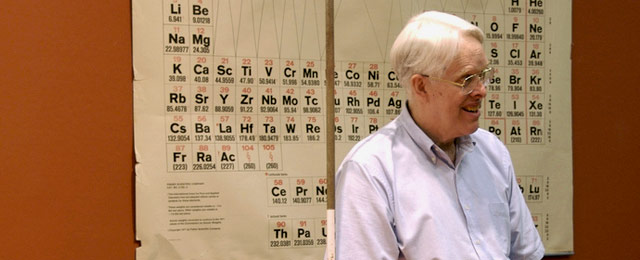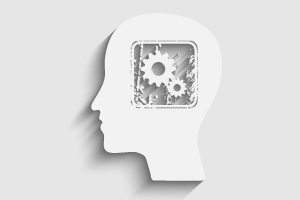Online courses directory (423)
This course explores the cognitive and neural processes that support attention, vision, language, motor control, navigation, and memory. It introduces basic neuroanatomy, functional imaging techniques, and behavioral measures of cognition, and discusses methods by which inferences about the brain bases of cognition are made. We consider evidence from patients with neurological diseases (Alzheimer's disease, Parkinson's disease, Huntington's disease, Balint's syndrome, amnesia, and focal lesions from stroke) and from normal human participants.
This is the first semester in a two-semester introductory course focused on current theories of structure and mechanism in organic chemistry, their historical development, and their basis in experimental observation. The course is open to freshmen with excellent preparation in chemistry and physics, and it aims to develop both taste for original science and intellectual skills necessary for creative research.
Designed for students without previous experience in techniques of cellular and molecular biology, this class teaches basic experimental techniques in cellular and molecular neurobiology. Experimental approaches covered include tissue culture of neuronal cell lines, dissection and culture of brain cells, DNA manipulation, synaptic protein analysis, immunocytochemistry, and fluorescent microscopy.
This course provides an introduction to the chemistry of biological, inorganic, and organic molecules. The emphasis is o
There is one thing I can be sure of: I am going to die. But what am I to make of that fact? This course will examine a number of issues that arise once we begin to reflect on our mortality. The possibility that death may not actually be the end is considered. Are we, in some sense, immortal? Would immortality be desirable? Also a clearer notion of what it is to die is examined. What does it mean to say that a person has died? What kind of fact is that? And, finally, different attitudes to death are evaluated. Is death an evil? How? Why? Is suicide morally permissible? Is it rational? How should the knowledge that I am going to die affect the way I live my life?
This free online learning course introduces the learner to the basic principles of Psychology from both a behavioural and biological perspective. The topics include classical and operant conditioning, the brain and the nervous system, stress and states of consciousness. All ALISON graduates are entitled to certification. This free Psychology course is an excellent complement to face-to-face classes and as a study guide or for those who would like to familiarise themselves with the fundamentals of Psychology.<br />
This course is an investigation of affective priming and creation of rigorously counterbalanced, fully computerized testing paradigm. Includes background readings, study design, counterbalancing, study execution, data analysis, presentation of poster, and final paper.
We are now at an unprecedented point in the field of neuroscience: We can watch the human brain in action as it sees, thinks, decides, reads, and remembers. Functional magnetic resonance imaging (fMRI) is the only method that enables us to monitor local neural activity in the normal human brain in a noninvasive fashion and with good spatial resolution. A large number of far-reaching and fundamental questions about the human mind and brain can now be answered using straightforward applications of this technology. This is particularly true in the area of high-level vision, the study of how we interpret and use visual information including object recognition, mental imagery, visual attention, perceptual awareness, visually guided action, and visual memory.
The goals of this course are to help students become savvy and critical readers of the current neuroimaging literature, to understand the strengths and weaknesses of the technique, and to design their own cutting-edge, theoretically motivated studies. Students will read, present to the class, and critique recently published neuroimaging articles, as well as write detailed proposals for experiments of their own. Lectures will cover the theoretical background on some of the major areas in high-level vision, as well as an overview of what fMRI has taught us and can in future teach us about each of these topics. Lectures and discussions will also cover fMRI methods and experimental design. A prior course in statistics and at least one course in perception or cognition are required.
This course provides an introduction to the physics and chemistry of the atmosphere, including experience with computer codes. It is intended for undergraduates and first year graduate students.
This seminar will focus on three sports: swimming, cycling and running. There will be two components to the seminar: classroom sessions and a "laboratory" in the form of a structured training program. The classroom component will introduce the students to the chemistry of their own biological system. With swimming, running and cycling as sample sports, students are encouraged to apply their knowledge to complete a triathlon shortly after the term.
This course is an introduction to cognitive development focusing on children's understanding of objects, agents, and causality. It develops a critical understanding of experimental design. The course discusses how developmental research might address philosophical questions about the origins of knowledge, appearance and reality, and the problem of other minds. It provides instruction and practice in written communication as needed for cognitive science research (including critical reviews of journal papers, a literature review and an original research proposal), as well as instruction and practice in oral communication in the form of a poster presentation of a journal paper.
This course introduces abstraction as an important mechanism for problem decomposition and solution formulation in the biomedical domain, and examines computer representation, storage, retrieval, and manipulation of biomedical data. As part of the course, we will briefly examine the effect of programming paradigm choice on problem-solving approaches, and introduce data structures and algorithms. We will also examine knowledge representation schemes for capturing biomedical domain complexity and principles of data modeling for efficient storage and retrieval. The final project involves building a medical information system that encompasses the different concepts taught in the course.
Computer science basics covered in the first part of the course are integral to understanding topics covered in the latter part, and for completing the assigned homework.
Parkinson's disease (PD) is a chronic, progressive, degenerative disease of the brain that produces movement disorders and deficits in executive functions, working memory, visuospatial functions, and internal control of attention. It is named after James Parkinson (1755-1824), the English neurologist who described the first case.
This six-week summer workshop explored different aspects of PD, including clinical characteristics, structural neuroimaging, neuropathology, genetics, and cognitive function (mental status, cognitive control processes, working memory, and long-term declarative memory). The workshop did not take up the topics of motor control, nondeclarative memory, or treatment.
This class is the second half of an intensive survey of cognitive science for first-year graduate students. Topics include visual perception, language, memory, cognitive architecture, learning, reasoning, decision-making, and cognitive development. Topics covered are from behavioral, computational, and neural perspectives.
To provide instruction and dialog on practical ethical issues relating to the responsible conduct of human and animal research in the brain and cognitive sciences. Specific emphasis will be placed on topics relevant to young researchers including data handling, animal and human subjects, misconduct, mentoring, intellectual property, and publication.
Introduction to the linguistic study of language pathology, concentrating on experimental approaches and theoretical explanations. Discussion of Specific Language Impairment, autism, Down syndrome, Williams syndrome, normal aging, Parkinson's disease, Alzheimer's disease, hemispherectomy and aphasia. Focuses on the comparison of linguistic abilities among these syndromes, while drawing clear comparisons with first and second language acquisition. Topics include the lexicon, morphology, syntax, semantics and pragmatics. Relates the lost linguistic abilities in these syndromes to properties of the brain.
This course covers introductory microbiology from a systems perspective, considering microbial diversity, population dynamics, and genomics. Emphasis is placed on the delicate balance between microbes and humans, and the changes that result in the emergence of infectious diseases and antimicrobial resistance. The case study approach covers such topics as vaccines, toxins, biodefense, and infections including Legionnaire’s disease, tuberculosis, Helicobacter pylori, and plague.
Mechanical forces play a decisive role during development of tissues and organs, during remodeling following injury as well as in normal function. A stress field influences cell function primarily through deformation of the extracellular matrix to which cells are attached. Deformed cells express different biosynthetic activity relative to undeformed cells. The unit cell process paradigm combined with topics in connective tissue mechanics form the basis for discussions of several topics from cell biology, physiology, and medicine.
The course will start with an overview of the central and peripheral nervous systems (CNS and PNS), the development of their structure and major divisions. The major functional components of the CNS will then be reviewed individually. Topography, functional distribution of nerve cell bodies, ascending and descending tracts in the spinal cord. Brainstem organization and functional components, including cranial nerve nuclei, ascending / descending pathways, amine-containing cells, structure and information flow in the cerebellar and vestibular systems. Distribution of the cranial nerves, resolution of their skeletal and branchial arch components. Functional divisions of the Diencephalon and Telencephalon. The course will then continue with how these various CNS pieces and parts work together. Motor systems, motor neurons and motor units, medial and lateral pathways, cortical versus cerebellar systems and their functional integration. The sensory systems, visual, auditory and somatosensory. Olfaction will be covered in the context of the limbic system, which will also include autonomic control and the Papez circuit. To conclude, functional organization and information flow in the neocortex will be discussed.
The amount of energy required to change the state of a substance depends on how strong or weak the bonds between the molecules are. For substances with strong bonds at standard temperature and pressure, like diamonds, it is extremely difficult to separate the molecules, whereas substances with weak bonds, like helium, remain in a gaseous form and do not condense into liquid or solid states. In this free online chemistry course you learn more about factors that affect the chemical nature of substances. You will learn why substances changing state can also be affected by mixing substances together. The course explains about using water as a solvent and mixing in different substances to see the effect on the boiling and melting points of the solution. This is followed by step by step examples of working out what the change in boiling or melting point will be based on the amount of solute added. This free online chemistry course will be of great interest to all students who wish to pursue a career in any of the sciences such as chemistry, physics, biology or geology, or the individual learner who simply wants to learn more about factors that affect the chemical nature of substances.<br />
Trusted paper writing service WriteMyPaper.Today will write the papers of any difficulty.






















